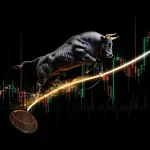Stock Market Winning Strategy: Success Begins with Defying the Crowd
Nov 5, 2024
Intro: The Financial Rebel’s Manifesto: Challenging the Status Quo
Forget everything you knew about playing it safe in the stock market. The conventional wisdom that slow and steady wins the race is a lie. If you want to come out on top, you must be a rebel, a maverick, willing to challenge the status quo and make bold moves. It’s time to stop being a sheep and start being a wolf. While the sheep blindly follow the herd, the wolf hunts independently, using its instincts and cunning to survive. Are you a sheep or a wolf? The choice is yours.
A Meeting of Minds: From Ancient Warriors to Wall Street
Imagine a battle arena, not of physical strength but of financial prowess. In one corner, we have Sun Tzu, the ancient Chinese military strategist renowned for his principles of tactics and strategy. In the other corner stands Warren Buffett, the legendary investor and one of the richest men in modern history. As they engage in a battle of wits, their strategies intertwine, revealing timeless principles applicable to both warfare and the stock market. Sun Tzu’s art of war becomes the art of investing, whereas Buffett’s strategies are the weapons of choice. Together, they showcase the synergy between ancient wisdom and modern financial warfare.
Now, let’s throw another wildcard into the mix: Cleopatra, the cunning ruler of ancient Egypt. Cleopatra understood the power of economics and finance, leveraging her resources to maintain her grip on Egypt. In a debate with Buffett, she might argue the importance of diversifying one’s investments, drawing parallels between her diverse trade networks and a well-diversified portfolio. This unexpected trio exemplifies the diverse range of expertise required to navigate the stock market successfully.
Unravelling the Psychology of the Market Masses
The stock market is not just a numbers game; it’s a psychological battlefield. Fear and greed are the driving forces behind investor behaviour, often leading to irrational decisions. Picture the ancient Greek philosopher Plato, renowned for his theory of forms, engaging in a thought-provoking discussion with Daniel Kahneman, the father of behavioural economics. Kahneman’s research reveals the cognitive biases that influence our financial decisions, while Plato’s theory of forms highlights the underlying essence or ‘form’ of things, including our emotional states. Together, they delve into the psychological traps investors fall into, such as the herd mentality, where individuals follow the crowd, driven by fear of missing out or the allure of potential gains.
Harnessing Chaos: Mastering Market Mayhem
To win the investment battle, you must embrace the chaos. It’s like taming a wild horse; you must understand its nature and work with its rhythm, not against it. Here, we bring in Genghis Khan, the ultimate conqueror known for his ability to adapt and harness the power of chaos. In a conversation with Nicolas Taleb, the author of “The Black Swan,” they explore the idea that chaos is not random but rather a source of opportunity. Genghis Khan’s military campaigns showcase the power of adaptability, while Taleb’s concept of ‘antifragility’ emphasizes the benefits of thriving in disorder. Their collaboration reveals that mastering the stock market is about embracing and using volatility to your advantage.
Technical Analysis: The Maverick’s Edge
Technical analysis is the market maverick’s secret weapon, a predictive art form that unravels the mysteries hidden within charts and data. It’s like deciphering ancient runes that foretell the future, only with far greater accuracy. Leonardo da Vinci, the epitome of the Renaissance man, might compare technical analysis to his groundbreaking studies in anatomy, where he revealed the intricate patterns and structures that define the human form.
Da Vinci’s innovative thinking can be applied to market analysis by understanding the underlying structure and trends driving the market’s movements. Just as he saw beauty and order beneath the surface, we can also uncover the market’s underlying patterns and predict its future behaviour.
Imagine da Vinci collaborating with a modern-day technical analyst. Together, they would uncover the hidden geometry of the markets, identifying key levels of support and resistance, recognizing chart patterns, and applying Fibonacci ratios to predict future price movements with astonishing accuracy.
Technical analysis provides a unique edge, especially when combined with innovative thinking. It’s like wielding a sword forged from data and historical insights, allowing mavericks to cut through the noise and make strategic decisions. By embracing this approach, you become a market warrior, harnessing the power of patterns to navigate the chaotic waters of the stock market.
Consider the work of Charles Dow, the father of technical analysis, who developed the Dow Theory in the late 19th century. Based on his observations of market behaviour, Dow’s theory identified key principles that still guide technical analysts today. These principles include the concept of market trends, the idea that price movement is not random but rather moves in distinct trends, and the importance of volume, which confirms the strength of a trend.
Building on Dow’s foundation, modern technical analysts have developed many tools and indicators to enhance our understanding of market behaviour. For example, the Relative Strength Index (RSI) measures the speed and change of price movements, helping traders identify overbought or oversold conditions. Another popular tool is the Moving Average Convergence Divergence (MACD), which reveals changes in a trend’s strength, direction, and momentum.
Technical analysts can identify high-probability trading opportunities by incorporating these tools and indicators. It’s like having a market compass guiding your decisions, helping you navigate the noise and volatility. Technical analysis also provides clear rules for risk management, such as setting stop-loss orders to limit potential losses and profit targets to lock in gains.
In the spirit of maverick thinking, it’s essential to recognize that technical analysis is not without its critics. Some argue it’s akin to reading tea leaves, relying too heavily on past data to predict future outcomes. However, when combined with a strong understanding of market psychology and a dash of contrarian thinking, technical analysis becomes a formidable tool in the market maverick’s arsenal.
The Contrarian’s Guide to Market Mastery: Swimming Against the Tide
Being a contrarian investor is like being a lone wolf swimming against the tide. It takes courage and a keen eye for spotting hidden opportunities. Picture Socrates, the ancient Greek philosopher, challenging the herd mentality of his time. He would question why people follow the crowd instead of thinking for themselves. This translates to investors blindly following market trends without critical analysis in the financial world. Socrates would advocate for independent thinking and seeking out undervalued investments, much like a wolf hunting for its prey.
Contrarian investing requires the foresight to recognize when the tide is about to turn, much like predicting a storm before the clouds gather. It’s about questioning assumptions and seeking opposing viewpoints, just as Socrates encouraged his students to do through his Socratic method. By embracing this method, investors can develop the critical thinking skills to make informed decisions, and spot undervalued stocks.
Take the example of Warren Buffett, a renowned investor and contrarian thinker. Buffett once said, “Be fearful when others are greedy, and greedy when others are fearful.” This captures the essence of contrarian investing. When the market is booming and others are driven by greed, the contrarian may recognize a potential bubble and prepare for a downturn. Conversely, when fear grips the market, the contrarian might spot undervalued stocks and seize the opportunity to buy.
Let’s bring in an unexpected expert: Nikola Tesla, an innovative scientist and engineer. Tesla’s approach to electricity revolutionized the world, and his contrarian thinking can be applied to investing. He once said, “The day science begins to study non-physical phenomena, it will make more progress in one decade than in all the previous centuries of its existence.”
Contrarian investing also involves challenging conventional wisdom and seeking out unconventional opportunities. This is where the ancient Chinese philosopher Lao Tzu’s wisdom comes into play. He advised, “Those who know do not say, and those who say do not know.” In the investing world, this could translate to seeking out hidden gems that others overlook. It’s about trusting your research and analysis, even if it goes against the grain.
Contrarian investing requires resilience and conviction. Investors must be prepared to withstand criticism and doubt when they go against the herd. This is where the ancient Roman philosopher Seneca’s wisdom comes to life. He said, “It is not because things are difficult that we do not dare; it is because we do not dare that they are difficult.” Seneca’s words encourage investors to dare to be different and embrace the challenges of contrarian investing.
The Final Word: Seizing Control of Your Financial Destiny
To win the damn investment battle, you must become the master of your financial destiny. It’s like being the captain of a ship navigating through uncharted waters. It would help if you had the wisdom of ancient mariners like Christopher Columbus, who dared to explore unknown territories, combined with the modern-day navigation tools of satellite technology and real-time data analysis. By blending their perspectives, you gain the confidence to venture into uncharted investment territories, knowing you have the tools to navigate any possible storms.
So, my fellow mavericks, are you ready to sail on this financial voyage? Embrace your inner rebel, challenge conventions, and harness the power of ancient wisdom and modern strategies. Remember, the stock market is a wild beast, but with the right tools and mindset, you can tame it and forge your path to financial success. Now go forth, conquer the markets, and never look back!
Post-Battle Analysis: Continuous Evolution
The investment battle is not a one-time skirmish but an ongoing war. To maintain your edge, you must continuously evolve, adapting to new market conditions and refining your strategies. This is where the ancient Greek philosopher Heraclitus comes into play, renowned for his philosophy of change and his famous quote, “Change is the only constant.” Heraclitus would argue that the only way to thrive in a dynamic market is to embrace change and become a master of adaptation. By incorporating his philosophy, you develop the agility to navigate market shifts and the resilience to weather any financial storms that may lie ahead.
In conclusion, winning the damn investment battle is not just about making profitable trades; it’s about adopting a maverick mindset that challenges conventions and embraces the wisdom of the ages. It’s a continuous learning, adapting, and evolving journey where ancient insights merge with modern strategies to conquer the ever-changing stock market landscape.
Beyond Boundaries: Exploring Thought in Uncharted Realms













